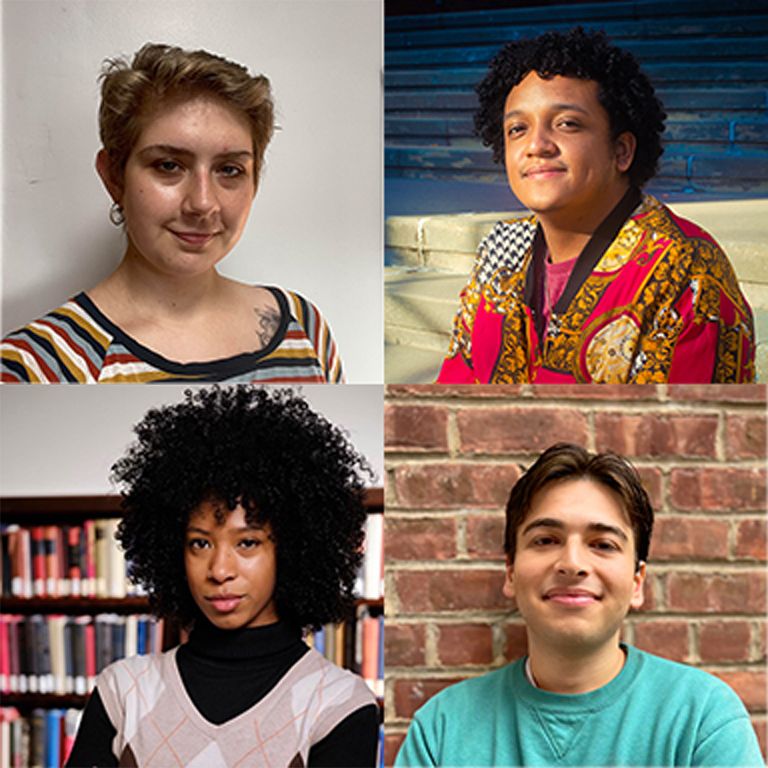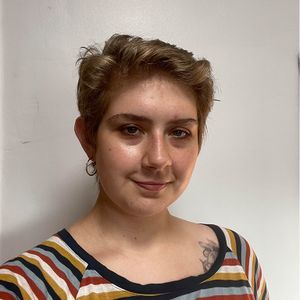 Avidor Auden
Avidor Auden
The Emergent Culture of Autism in America: An Anthropological Study investigates autism as a developing cultural identity in the U.S. This project explores the ways in which American culture defines disability by the standards of capitalism, and how the neurodiversity movement has begun to challenge these notions. Avidor's research tracks the concept of autism in its transition from a biomedical condition to a cultural difference in the public eye, and how recent autistic-led communities have effected this change. Their project attempts to bring autistic perspectives into focus, putting forward both progressive and conservative mindsets in autistic subcultures. (Professor Ignasi Clemente Pseudo, Anthropology)
For outreach, Avidor is interviewing several individuals involved in the neurodiversity movement in order to understand their perspectives and hopes for the future of disability activism. They plan on recording these interviews and advertising them to the public in order to bring voice to a community which often goes unheard by mainstream media.
 Samantha Carter
Samantha Carter
“That Magical Frontier”: The Strategy of Performance within Emily Dickinson’s Sadomasochistic Voice explores Emily Dickinson’s protestations against binary limitations of definition through her employment of a sadomasochistic voice. Samantha argues that the utilization of this voice confounds regulated space through gendered performance, resulting in a lexicon that both conforms to and subverts regulations of sex and gender. By analyzing such poems as “The saddest noise, the sweetest noise,” this project explains Dickinson’s utilization of “hesitation” as the gap allowing the bodily senses to reach into the sublime. (Professor Amy Robbins, English)
Outreach focuses on the creation of a zine that emphasizes gender and sexual liberation. Participants will contribute to the zine through prose, poetry, and images. Through publication, these mediums of creation will further the connection between sexual/gender liberation and artistic forms.
 Emily Chan
Emily Chan
An Analysis of Abortion Aid Organizers in a Reproductive Justice Framework examines the history of reproductive healthcare and advocacy, with a focus on poor and working-class people of color. Although most current mainstream attention on abortion has been on the “pro-life” and “pro-choice” legal binary, this project examines the nuances of abortion access and reproductive healthcare by relating the different histories of reproductive healthcare to the forms of aid offered by abortion aid organizers today, post-Dobbs v. Jackson. (Professor Deborah Tolman, Women and Gender Studies)
Outreach takes the form of a video screening of conversations held with New York City’s public about reproductive autonomy and the accessibility of childrearing resources. The screening will be followed by a panel discussion with reproductive justice scholars about how mainstream dialogues surrounding reproductive autonomy can be expanded moving forward.
| Name | Emily Chan |
| Project | An Analysis of Abortion Aid Organizers in a Reproductive Justice Framework |
| Year | 2023-2024 |
| Format | Video Presentation |
 Fratchelya Ciputra
Fratchelya Ciputra
Locked up and Left Behind: The Experience of Expecting Women of Color in Mass Incarceration asks: Does our incarceration system deserve the term “criminal justice”? This project challenges the assumption that the U.S. criminal justice system is just and that mass incarceration primarily affects men of color. The biases of the criminal justice system and the war on drugs have equally affected women of color. This project seeks to undercover the forgotten history of women of color and expecting women in the incarceration system through the lenses of various feminist theorists and criminologists, and in particular the work of Michelle Alexander and Bryan Stevenson. (Professor Robyn Marasco, Political Science)
For outreach, Fratchelya is conducting an internship at Legal Hand, a nonprofit that aims to make justice more accessible to the community. Her internship consists of assisting clients by researching and providing publicly available legal information, assistance, and referrals, as well as updating Legal Hand Jamaica’s database of resources and information. She is also assisting in the expansion of Legal Hand's network by connecting the organization with local nonprofits. Fratchelya is also working on a short film documenting how Legal Hand accomplishes its mission of making justice more accessible.
| Name | Fratchelya Ciputra |
| Project | Locked up and Left Behind: The Experience of Expecting Women of Color in Mass Incarceration |
| Year | 2023-2024 |
| Format | Video Presentation |
 Elizabeth de Furia
Elizabeth de Furia
Desire into Distress: Dissident Psychiatry under Counterculture and Capitalist Realism transplants the cultural theories of the late British critic Mark Fisher into academic and medical critiques of psychiatry from the mid-century to the present. Elizabeth applies the Fisherian concept of psychedelic consciousness “with its key notion of the plasticity of reality” to properly situate twentieth-century academic critiques of psychiatry. This project’s ultimate goal is to interrogate the twenty-first-century project of critical psychiatry. (Professor Justin Garson, Philosophy).
 Tyler Diaz
Tyler Diaz
De-centering Europe in American Music Education: Philadelphia as a Black Musical Center During the Nineteenth Century highlights a lesser-known era in American music and uses that history to restore Black voices in music studies. Philadelphia was the social and cultural center for African Americans throughout the nineteenth century, and during this period Black musicians gained great popularity. They were celebrities and innovators who fueled the social dance scene through their music and developed a distinctly American sound. Reviving their contributions to music ushers in a new focus for contemporary music education. (Professor Catherine Coppola, Music)
For outreach, Tyler is writing public blog posts to highlight musicians from this era. He is also producing a teacher’s guide for public school teachers with the 1838 Black Metropolis, an organization that restores Black experiences within historical settings. Tyler’s work culminates in a concert and roundtable discussion at the Museum of American Revolution in Philadelphia, focusing on this topic’s inclusion in educational settings.
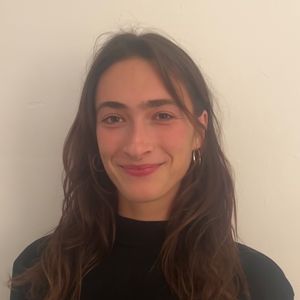 Sophie Frizzell
Sophie Frizzell
Uses of the Erotic in Pina Bausch’s Dancetheater explores German choreographer Pina Bausch’s choreographic process through the lens of poet-activist Audre Lorde’s writing on eroticism. Beginning with an in-depth analysis of Bausch’s stichworte (keyword) method, this project follows Bausch’s creative process from the genesis of a piece to its so-called “end.” Focusing on interiority, this project explores the resonances between Lorde’s notion of the erotic and Bausch’s methodology and, in so doing, examines the ways in which Bausch uniquely engaged the choreographic process. (Professor Maura Nguyen Donohue, Dance)
For outreach, Sophie is interning in the archives division at the Brooklyn Academy of Music (BAM). Using archival and interview footage, Sophie is creating a video essay that explores the re-staging of Bausch's works. Centering questions of 'authorship' and 'inheritance', this video essay highlights the uses of collaboration and its relationship to longevity.
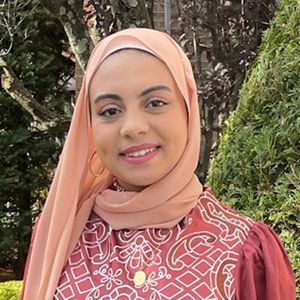 Laila Gad
Laila Gad
Social and Health Impacts of Rising Temperatures on Older Adults in the South Bronx and Harlem aims to explore what factors influence older adults' adaptive behaviors and perception of environmental risk, particularly in terms of climate-change-induced rising average temperatures. This project explores three components of perceived risk among older adults: 1) Historical correlations between redlining and availability of green space, 2) Neighborhood culture and the manifestation of social isolation behaviors, and 3) Socioeconomic associations with heat-induced morbidity. (Professor Christian González-Riviera, Brookdale Center for Healthy Aging)
Focused on low-cost adaptations like NYC’s Cooling Centers, Laila’s public outreach project discusses the barriers BIPOC older adults face when attempting to access cooling methods within their neighborhoods and homes. She undertakes a series of interviews with cooling centers across the city to understand what is and isn’t working for New Yorkers when it comes to cooling down in the summer. Her efforts culminate in an event gathering older adults, non-profit leaders, and others to discuss their experiences with Cooling Centers.
| Name | Laila Gad |
| Project | Social and Health Impacts of Rising Temperatures on Older Adults in the South Bronx and Harlem |
| Year | 2023-2024 |
| Format | Video Presentation |
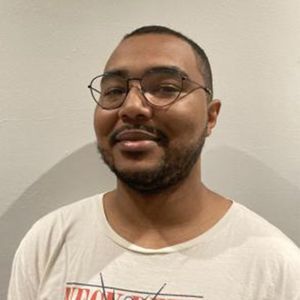 Melvin Gonzalez
Melvin Gonzalez
Disaster, Private Enterprise and Community Based Organizations examines the socioeconomic relationship between private businesses and governmental agencies using hurricanes Katrina, Sandy and Maria as case studies. Each case study examines how private enterprises affect various aspects of aid such as essentials, electricity and insurance. Ultimately, the paper argues for community-based organizations as a viable investment to provide relief. (Professor Ricardo Miranda, Media Studies)
For his public outreach, Melvin is developing an interactive game called “Dystopia: After the Flood” which simulates disaster relief efforts after a flood event. Participants are tasked with cleaning up areas, providing aid and saving civilians while navigating flooded areas. This outreach project will culminate in a public demonstration in which participants can interact with the game.
| Name | Melvin Gonzalez |
| Project | Disaster, Private Enterprise and Community Based Organizations |
| Year | 2023-2024 |
| Format | Video Presentation |
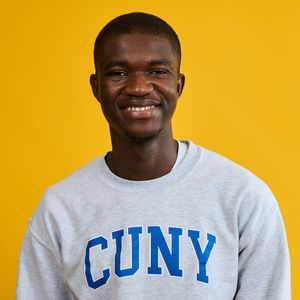 Bassrou Juwara
Bassrou Juwara
Assessing CUNY BMI Program: Improving Higher Education Outcomes for Men of Color aims to evaluate the efficacy of CUNY’s Black Male Initiative (BMI) program. This publicly funded NYC initiative aims to support enrollment and retention of students from underrepresented groups at all twenty-five City University of New York (CUNY) campuses. This project examines quantitative data and collects qualitative oral histories with students, advisors, faculty and administrators to measure the impact of the diverse enactment of the BMI program at CUNY. (Professor Samuel Finesurry, Cuban History)
For outreach, Bashir is interning under Jonathan Quash, CUNY's BMI director. Through his internship, Bashir is interviewing BMI students and directors in order to produce a film that is accessible on the program's website.
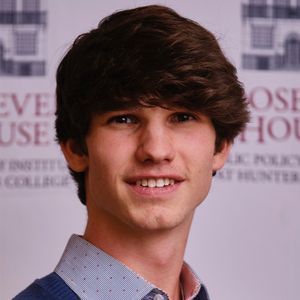 Laszlo LeCroy
Laszlo LeCroy
Artificial Intelligence: Societal Influence on the Human Mind: Drawing parallels between artificial intelligence (AI) and the human mind, this paper argues that human decision-making is shaped by the information one consumes, akin to how an AI's outputs are influenced by its training data. A particular focus of this project is the attention economy—content producers prioritize capturing and retaining user attention over communicating information thoroughly. This narrows the spectrum of information available for decision-making, threatening users’ freedom. Ultimately, this project urges policymakers and individuals to re-evaluate the incentive structures that mold the information landscape. (Professor Robyn Marasco, Political Science)
For outreach, Laszlo is creating an animated video series and website to teach social media users about concepts like free will and the attention economy. Each video considers one topic and provides a central argument to encourage engagement. The website offers users a space to quiz themselves, as well as a forum for viewer discussion.
| Name | Laszlo LeCroy |
| Project | Artificial Intelligence: Societal Influence on the Human Mind |
| Year | 2023-2024 |
| Format | Video Presentation |
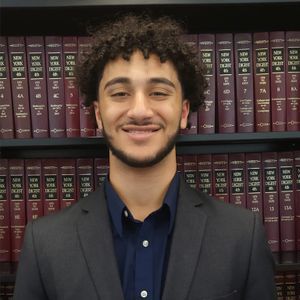 Andrew Loka
Andrew Loka
The Development of Community and Identity: Comparing and Contrasting the Development of Arab Communities in the United States and Europe: The Arab communities within the United States and Europe certainly do not constitute a monolith, with variations in nation of origin and class. However, this broader study of Arab Americans and their European counterparts seeks to understand the causes of existing differences between these two groups in terms of their overall socioeconomic status and level of integration within their respective countries. In understanding colonialism’s impact on Arab migration and their perception in the United States and Europe, the paper uncovers the roots of these different immigrant experiences in each continent. (Professor Jillian Schwedler, Political Science)
For outreach, Andrew is working with the Ibrahim Student Leadership & Dialogue Middle East Program to host an Arab American entrepreneurial networking event. The event is designed to build professional fellowship and community among Arab American entrepreneurs, encourage collaboration, and aid entrepreneurs seeking to invest in and benefit the Arab world.
| Name | Andrew Loka |
| Project | The Development of Community and Identity: Comparing and Contrasting the Development of Arab Communities in the United States and Europe |
| Year | 2023-2024 |
| Format | Video Presentation |
 Yamila Martinez
Yamila Martinez
The Pandemic Lockdown and Exclusion Policies Towards Undocumented Immigrants explores the CARES ACT and COVID-19 Relief Bill’s exclusion of undocumented immigrants and their American children, which jeopardized the survival of more than fourteen million people during the pandemic lockdown. Drawing parallels between this recent instance and historical instances of exclusionary policies, such as the Mexican Repatriation during the Great Depression and the internment of Japanese Americans during World War II, this project investigates the logics behind exclusionary U.S. policies. (Professor Charles Tien, Political Science)
Outreach consists of a website where the public can access videos of interviews with undocumented immigrants during the pandemic lockdown. From March to July of 2020—the intense national lockdown period where only essential workers were able to work in the public space—five million undocumented immigrants labored as essential workers in farms, the food industry, and healthcare, among other jobs. These interviews will allow the public to connect with undocumented individuals and their stories, providing a human face to an important debate on U.S. policy.
| Name | Yamila Martinez |
| Project | The Pandemic Lockdown and Exclusion Policies Towards Undocumented Immigrants |
| Year | 2023-2024 |
| Format | Video Presentation |
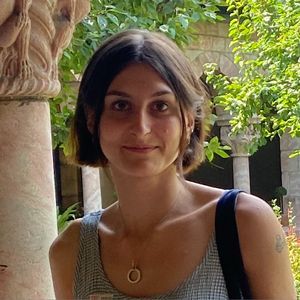 Mira Maxwell
Mira Maxwell
Writing Disintegration: Spatial Fixes and Queer Futurity in David Wojnarowicz’s West analyzes depictions of the American railways in the work of writer, artist, and AIDS activist Davjd Wojnarowicz. Exploring the specters of frontier expansion in writings from Wojnarowicz’s time freighthopping in the 1970s, this project maps his means of aesthetic production onto the means of production that formed the landscapes within which he moved. In so doing, Mira’s research works to contextualize Wojnarowicz’s work within the dissolution of the railway system and the emergence of neoliberal social logics. (Professor Jeremy Glick, English)
For outreach, Mira is pursuing an internship at the Lower East Side Harm Reduction Center (LESHRC), founded by members of ACT-UP in the early 1990s. In addition to her shifts in the clinic, Mira is working to coordinate a series of teach-ins that delve into the history of the harm reduction center. The series will consist of Narcan trainings, the presentation of archival documents surrounding the center’s founding, interviews with figures involved with the establishment of LESHRC, and screenings of films that touch upon the intersections between the AIDS crisis and the opioid crisis.
| Name | Mira Maxwell |
| Project | Writing Disintegration: Spatial Fixes and Queer Futurity in David Wojnarowicz’s West |
| Year | 2023-2024 |
| Format | Video Presentation |
 Avi Mikhaylov
Avi Mikhaylov
Navigating the Intersection of Cultural Expectations and Personal Health Autonomy: Young Women's Attitudes Towards Reproductive Healthcare in Communities with Restricted Access investigates the overlap of cultural stigma and gynecology via ethnographic interviews with unmarried young women whose parents do not allow them to see a gynecologist for cultural reasons. This project analyzes how they balance their reproductive healthcare autonomy with cultural expectations, and examines how these participants feel about taboos within their own communities versus widespread American norms. (Professor Ignasi Clemente Pseudo, Anthropology)
For outreach, Avi is conducting a series of interviews with parents who are hesitant to vaccinate their children for human papillomavirus (HPV). Drawing on the concerns expressed in these interviews, Avi is creating, with the CUNY School of Public Health, a decision-aid tool that provides evidence-based information in various formats to educate parents on the possible benefits/harms of HPV vaccination and increase active intrafamilial participation in the decision-making of vaccine uptake.
| Name | Avi Mikhaylov |
| Project | Navigating the Intersection of Cultural Expectations and Personal Health Autonomy: Young Women's Attitudes Towards Reproductive Healthcare in Communities with Restricted Access |
| Year | 2023-2024 |
| Format | Video Presentation |
 Nicole Palmetto
Nicole Palmetto
Social, Economic, and Physical Impacts of Caregiving on Young Adult Caregivers in NYC studies young adults who serve as caregivers for older adults in New York City. This project focuses on the impact of four factors on young adult caregivers: culture, race, ethnicity, and gender. This project aims to inform policymakers on how to best assist young caregivers in NYC through protection or support. (Professor Christian González-Riviera, Brookdale Center for Healthy Aging)
Outreach consists of an Instagram page highlighting the lived experiences of young adult caregivers within the City University of New York (CUNY) Community, titled “Caregivers of CUNY.” This page aims to provide a forum to connect caregivers with each other. The page also works to educate and engage those in and outside of the CUNY community who are interested in gaining insight into the perspectives of young adult caregivers.
| Name | Nicole Palmetto |
| Project | Social, Economic, and Physical Impacts of Caregiving on Young Adult Caregivers in NYC |
| Year | 2023-2024 |
| Format | Video Presentation |
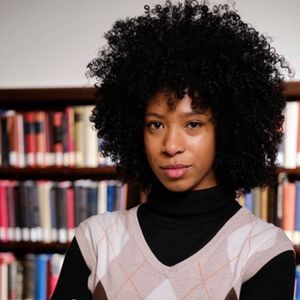 Isabellah Paul
Isabellah Paul
Black Above Reality: Afrosurrealism in Contemporary Black Horror Cinema investigates the incorporation of Surrealist elements into Horror Noire to expose the concealed atrocities and terrors of the Black experience. This research aims to analyze how Afrosurrealism as an artistic movement serves as an impetus to further highlight the systemic issues inflicting Black communities. By examining select Black-directed horror films, this project uncovers how the employment of the dreamlike and the fantastical showcases the extant and grim lived experiences of Black individuals in the United States. (Professor Kelly M. Nims, English)
Outreach comprises a video installation incorporating elements of Afrosurrealism and Horror Noire while engaging in conversations concerning racial injustice and structural violence. A subsequent panel discussion will then be held, seeking to connect the themes displayed in the installation to broader discussions of racial inequality and violence, as well as their impacts on varying Black communities in America.
 Kostyantyn Polonskyi
Kostyantyn Polonskyi
Letters from the (In)Visible Land: the Political History of the Anthology The Executed Renaissance and Its Publication explores the political history of the first publication of The Executed Renaissance, edited by Jurij Lawrynenko. An anthology of Ukrainian literature from the 1920s to the 1930s, this book tracks a generation of Ukrainian writers who were oppressed during the Stalin purges. Focusing on the process of compiling and publishing this anthology, Kostyantyn aims to broaden understandings of the relationship between the peoples of Poland, Ukraine, and Russia. Other topics this project touches on are the metropolis and the colonies, as well as related issues of identity, imperial trauma and post-colonial reconciliation. (Professor Yasha Klots, Classical & Oriental Studies)
For outreach, Kostyantyn is creating a web archive comprised of documents related to the anthology. Never published together before, the archive includes more than 100 archival materials surrounding the creation of The Executed Renaissance and is available in English and Ukrainian.
| Name | Kostyantyn Polonskyi |
| Project | Letters from the (In)Visible Land: the Political History of the Anthology The Executed Renaissance and Its Publication |
| Year | 2023-2024 |
| Format | Video Presentation |
 Hudson Stephens
Hudson Stephens
The Development of Queer Athletics in New York City: An Analysis of Male Sexual Identity in 21st-Century Sport seeks to hypothesize the development of queer athletic spaces in New York City at a time when non-heterosexual athletes are experiencing the greatest degree of acceptance in heteronormative settings like team sports. Rooted in the work of Judith Butler, Eric Anderson, and Michel Foucault, this project analyzes gender and sexual identity performance and its exhaustive impact on hegemonic structures in hyper-hetero and masculine spaces. Through this lens, Hudson aims to explain the development of stereotypically “straight” spaces that bar queer people and the effects of open sexual identification in sports. (Professor Jeremy Glick, English)
For outreach, Hudson is working with the New York Ramblers (established in 1980), the world’s first organized openly gay soccer club. He helps their communication team to coordinate outreach and accessibility initiatives while focusing primarily on efforts to make the Ramblers known to New Yorkers interested in a queer community rooted in athletics. His work this semester will culminate in a documentary-style piece that illustrates the Ramblers’ story by engaging with both current and former members.
| Name | Hudson Stephens |
| Project | The Development of Queer Athletics in New York City: An Analysis of Male Sexual Identity |
| Year | 2023-2024 |
| Format | Video Presentation |
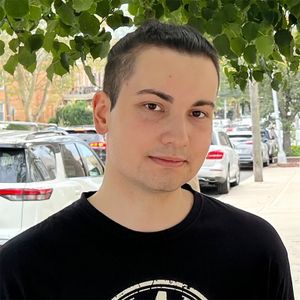 Thomas Szymanski
Thomas Szymanski
Lessons of David and Goliath: a Comparison of the Russo-Ukrainian War (2022-) and the Russo-Finnish (“Winter”) War (1939-40) examines parallels between these two wars. First, the project observes the progression of both wars, and highlights the similarities between Ukrainian and Finnish struggles to defend their homeland from invaders. Second, this project focuses on questions of foreign aid and support, both from the perspective of Ukraine and Finland and from that of neighboring states. The project engages in a critical analysis of factors belonging to both wars in order to emphasize the importance of continued support for Ukraine. (Professor Benjamin Hett, History)
For outreach, Thomas is conducting an internship at the Piłsudski Institute of America, where he is taking part in archival work, including the digitization of historical materials to make them accessible to the public. As part of his internship, Thomas is producing an English-language video to educate the public about the Institute and encourage visitors.
| Name | Thomas Szymanski |
| Project | Lessons of David and Goliath: a Comparison of the Russo-Ukrainian War (2022-) and the Russo-Finnish (“Winter”) War (1939-40) |
| Year | 2023-2024 |
| Format | Video Presentation |
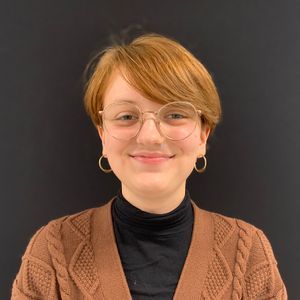 Annabelle Underwood
Annabelle Underwood
On-Screen and On The Spectrum: Representations of Autism in Media examines why the overwhelming majority of autistic characters, across all forms of media, reproduce oppressive, dehumanizing, and stereotypical portrayals of the disorder. This project considers how representations of autism have evolved, what issues and stereotypes persist, and why and how they affect autistic individuals. By examining its representation in media, this project aims to contribute to more authentic portrayals of autism which accurately depict the inherently diverse nature of the autistic community. (Professor Justin Garson, Philosophy)
For the outreach component, Annabelle is publishing a journalistic article and producing an interview-based podcast related to their research topic. This outreach project aims to amplify autistic voices in the media industry and synthesize Annabelle’s academic research for a broader audience.
| Name | Annabelle Underwood |
| Project | On-Screen and On The Spectrum: Representations of Autism in Media |
| Year | 2023-2024 |
| Format | Video Presentation |
 Evan Van Auken
Evan Van Auken
The Right to Disclose aims to inform ongoing debates on the prevalence of intelligence leaks in the United States. This project invokes questions regarding the morality of intelligence operations, the rights and civil liberties of American citizens, national security, and the nature of citizenship and statehood. Increasingly, academics, journalists, and lobbyists have adopted an anti-secrecy posture which stands in radical opposition to the U.S. intelligence community as a whole, and characterizes nearly any disclosure of classified information as a victory for the American public. This paper argues that too strong an anti-secrecy approach diminishes the currency of terms like “whistleblower,” fuels efforts to reduce transparency with the public, and leaves the U.S. more vulnerable to the most illiberal regimes in the world. This paper offers anti-secrecy proponents an alternative approach which can reduce leaks while increasing transparency. (Professor Benjamin Hett, History).
Evan's outreach involves collecting surveys that ask intelligence-related questions, conducting interviews, and using this data to identify both American and international attitudes toward the intelligence community. His project approaches the topic of intelligence leaks from an international perspective—a crucial, but often overlooked, component of the conversation on secrecy and the U.S. intelligence community—by comparing responses between those born in America and those born elsewhere. This project offers an answer to question of whether our domestic debate over intelligence leaks is constrained by American bias.
| Name | Evan Van Auken |
| Project | The Right to Disclose |
| Year | 2023-2024 |
| Format | Video Presentation |
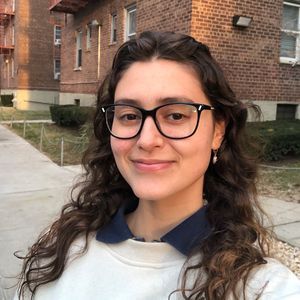 Anastasia Villarreal
Anastasia Villarreal
The Unethical Impact of MLMs on Human Relationships and the Need for Labor Protections examines how businesses that use multi-level marketing strategies negatively impact the personal relationships of people who are recruited to sell their products and recruit others to do the same. Anastastia argues that multi-level marketing companies deceive their recruits into exploitative labor that is not properly compensated and incentivize the formation of unhealthy relationships amongst recruits. The paper also proposes regulations that can prevent the mistreatment of people recruited into MLMs. (Professor Robert Mass, Philosophy)
For her outreach project, Anastasia is interning at the district office of State Senator Jessica Ramos in Jackson Heights, Queens. She has been working with staff to craft presentations and informational materials describing the nature of multi-level marketing scams, why they are harmful, and how community members can stay safe. Anastasia is also hosting a workshop with Make the Road where she and a translator presented on the dangers of multi-level marketing scams to community members.
| Name | Anastasia Villarreal |
| Project | The Unethical Impact of MLMs on Human Relationships and the Need for Labor Protections |
| Year | 2023-2024 |
| Format | Video Presentation |
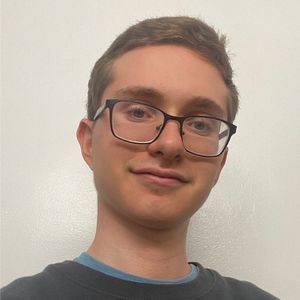 Alex Vtorov
Alex Vtorov
Bridges to Service: Machine Translation and Community Partnerships in the NYC DOHMH proposes a twofold strategy for improving New York City’s language access services, with a particular emphasis on expansions to the City’s public health infrastructure. Firstly, the Department of Health and Mental Hygiene can improve outreach to limited English proficiency (LEP) communities by reinvigorating and formalizing lapsed partnerships with already-embedded multilingual community leaders and organizations. Secondly, translation and interpretation services, particularly for less-frequently spoken languages, can be supplemented by well-supervised machine translation. (Professor Paul McPherron, English)
Outreach consists of a public-facing prototype of a natural language interface and chatbot, trained on public-access materials and information published by the DOHMH. Ultimately, Alex is working to expand the model for systematic review by bilingual speakers of under-served languages, verifying both the accuracy and efficacy of automated translation tools for vulnerable New Yorkers.
| Name | Alex Vtorov |
| Project | Bridges to Service: Machine Translation and Community Partnerships in the NYC DOHMH |
| Year | 2023-2024 |
| Format | Video Presentation |
 Jasper Willey
Jasper Willey
Homelessness in New York City, 1978-88 examines economic restructuring, urban development, and housing policy between 1978 and 1988. This project posits that this decade served as an inflection point in New York City’s treatment of its unhoused population, and created the conditions for the city’s astronomically high rates of homelessness today. By analyzing urban development, gentrification, and economic trends of this decade, this paper elucidates policies of the same period that were hostile toward unhoused individuals, and intends to inform current NYC lawmakers on future housing policy decisions and solutions. (Professor Catherine Tinker, Human Rights Program)
For outreach, Jasper is working in the Research and Policy Development Department at the Coalition for the Homeless. He is currently gathering and analyzing housing data to assist in writing the Coalition’s reports, such as their annual State of the Homeless report.
| Name | Jasper Willey |
| Project | Homelessness in New York City,1978-88 |
| Year | 2023-2024 |
| Format | Video Presentation |
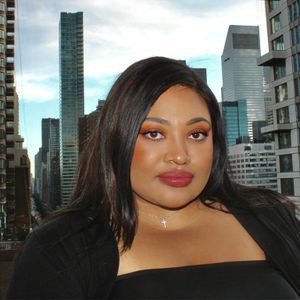 Alethia Williams
Alethia Williams
“Education is Our Passport to the Future”: Inequitable Education in Harlem and its Psychological Impact on Black Harlem Students is a study of Harlem’s unjust and racially segregated education system. By analyzing the history of Harlem public schools, pre- and post-Brown v. Board of Education, this project reflects on the psychological impact that segregation has had on generations of Black Harlem residents. Identifying these disparities is the first step toward closing the achievement gap for Black students through mental health resources and equal opportunity. (Professor D'Weston Haywood, History)
Outreach consists of an event called “H.A.R.L.E.M,” which stands for “Helping Adolescents Redefine Life, Education, & Mental-Health.” Alethia is partnering with a Harlem non-profit organization called the H.O.P.E Center as well as two mental health clinics, Behavioral Associates NY and New Leaf Mental Health Counseling. For the event, she is hosting a public panel discussion at the Hunter College Silberman School of Social Work with mental health professionals, educators, and Harlem students who will speak to the community about the history of injustice in Harlem. The panel will also promote mental health awareness for students of color, as well as the importance of education as a method to obtain positive life outcomes.
| Name | Alethia Williams |
| Project | “Education is Our Passport to the Future”: Inequitable Education in Harlem and its Psychological Impact on Black Harlem Students |
| Year | 2023-2024 |
| Format | Video Presentation |
 Jillian Wing Louie
Jillian Wing Louie
The Need to Know in Tongues: Contextualizing Bangladeshi Linguistic Nationalism in Diasporic Communities argues that upholding language variation and preserving linguistic diversity is a necessary component of resistance, rebellion, and the preservation of communal identity. (Professor Paul McPherron, English)
For outreach, Wing is interning at Lincoln Center, where they are working with community-based curators to create an event that uplifts diasporic and international communities. In addition, Wing is conducting a series of interviews with various curators to showcase the process of planning events and exhibits with comprehensive representation and relationships with artists in mind.
| Name | Jillian Wing Louie |
| Project | The Need to Know in Tongues: Contextualizing Bangladeshi Linguistic Nationalism in Diasporic Communities |
| Year | 2023-2024 |
| Format | Video Presentation |
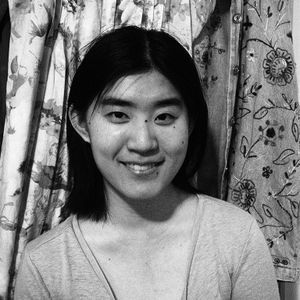 Maya Wong
Maya Wong
The Noise That Stopped the Carnival: White Papers as the Next Chinese Language Game is an interdisciplinary study of language and power that combines philosophies on discourse theory and semiotics with the study of contemporary Chinese media and social networks. This project employs Marshall McLuhan’s insights on information revolution and Juri Lotman’s models of semiotic spaces in a survey of creative and satirical tactics that Chinese netizens use to survive online censorship, and the ways the State responds to the changing internet ecology. (Professor Richard Belsky, History)
For outreach, Maya is interning at the Council on Foreign Relations, an independent think tank specializing in U.S. foreign policy and international relations. Focusing on Asia Studies, she is producing weekly newsletters on Chinese domestic and foreign policy which will be presented to China scholars. Maya is also curating materials for China Unofficial Archives, a virtual environment dedicated to making accessible key documents, movies, blogs, and publications for Chinese people seeking to reclaim their country's history.
| Name | Maya Wong |
| Project | The Noise That Stopped the Carnival: White Papers as the Next Chinese Language Game |
| Year | 2023-2024 |
| Format | Video Presentation |

